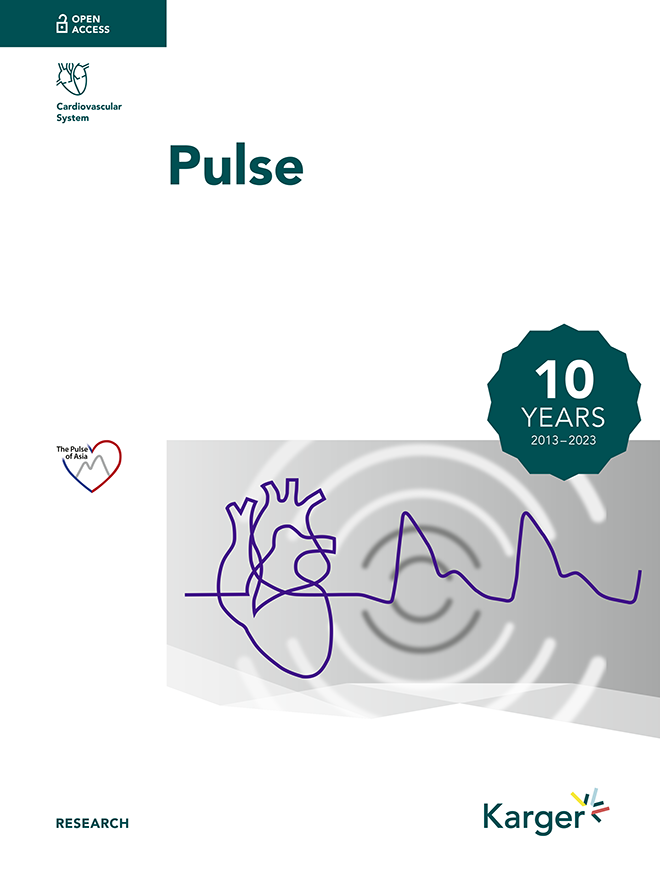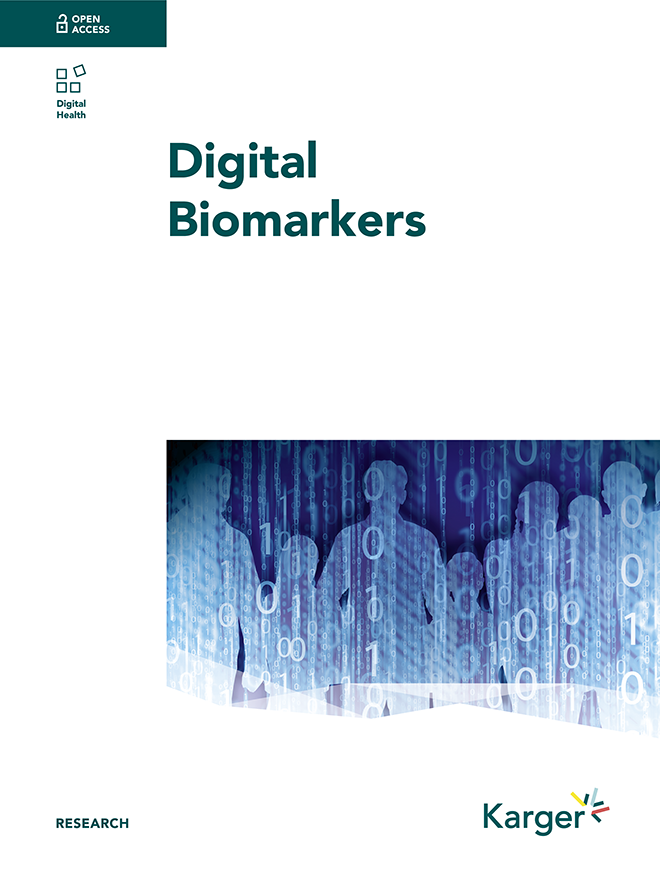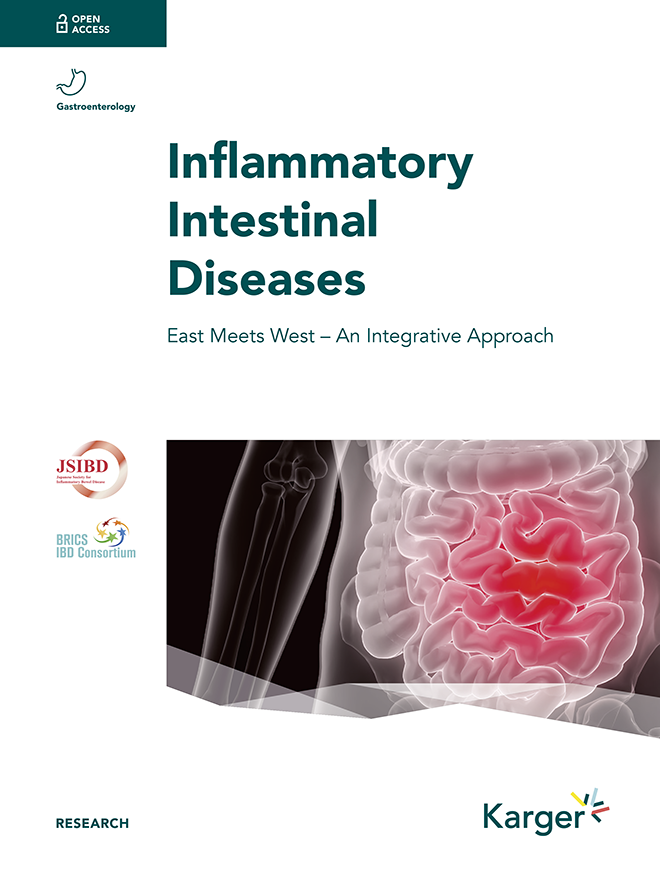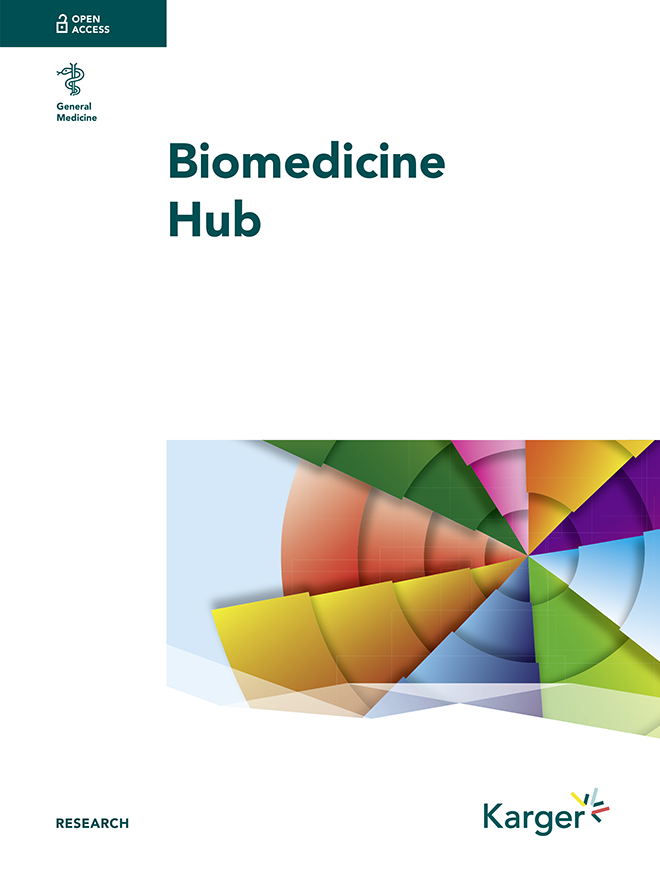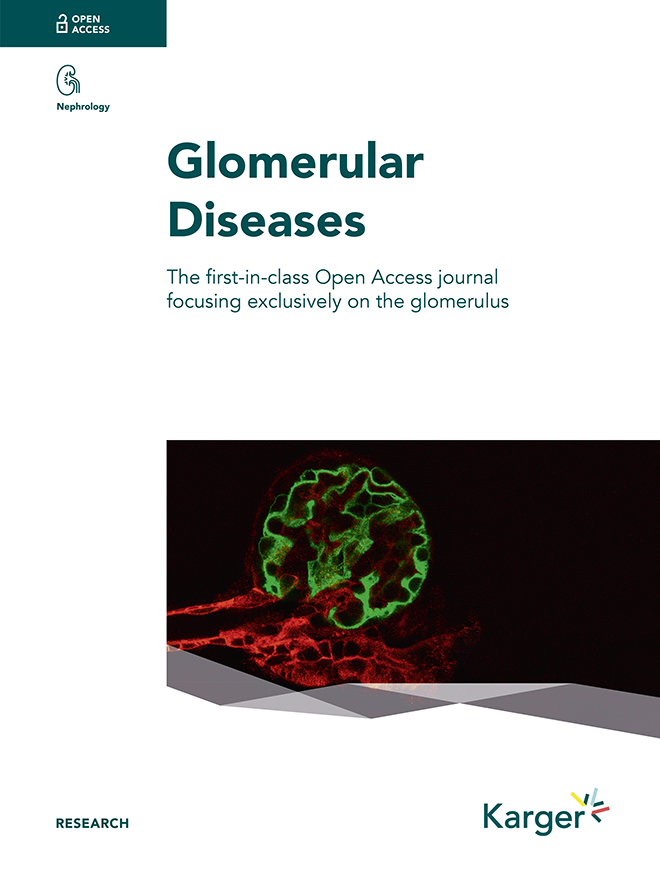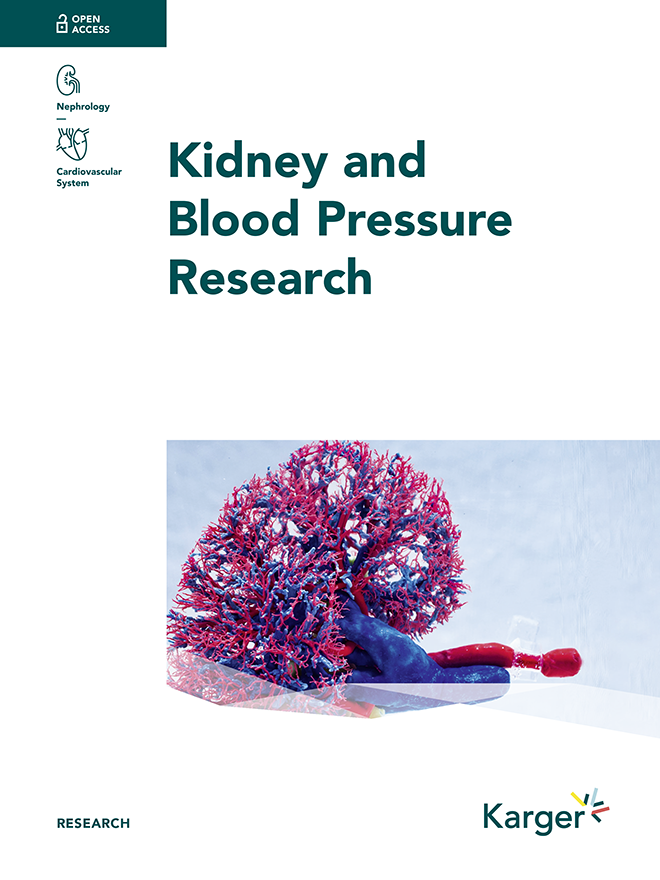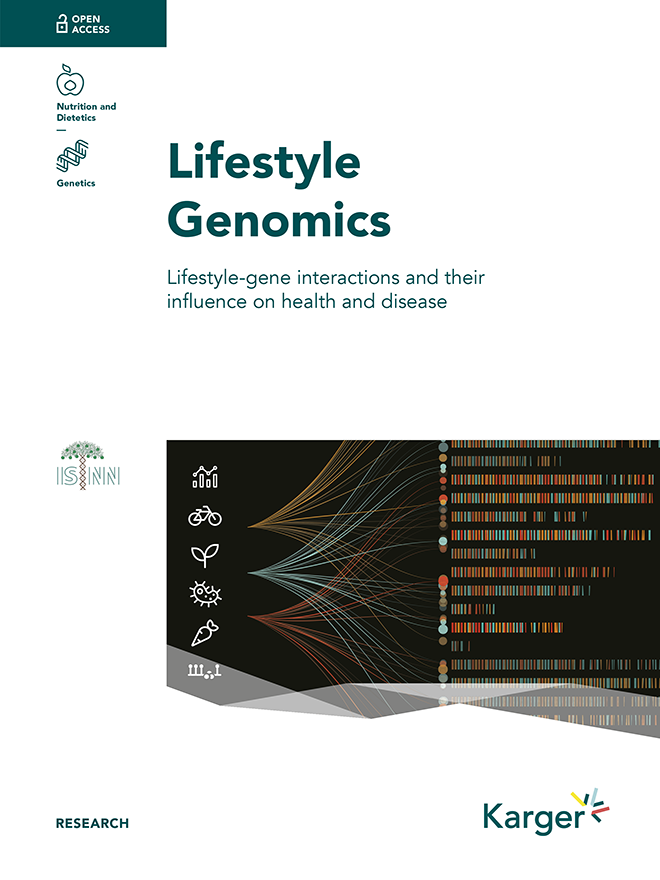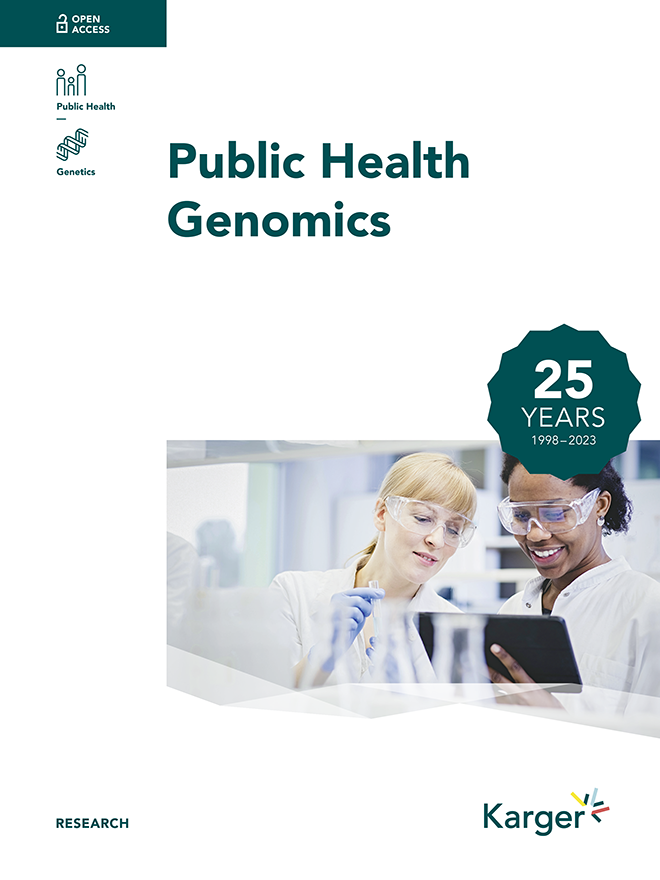
RESEARCH
Calls for Papers
Submission Status
Subject Areas
Loading, please wait...
Cardiovascular System
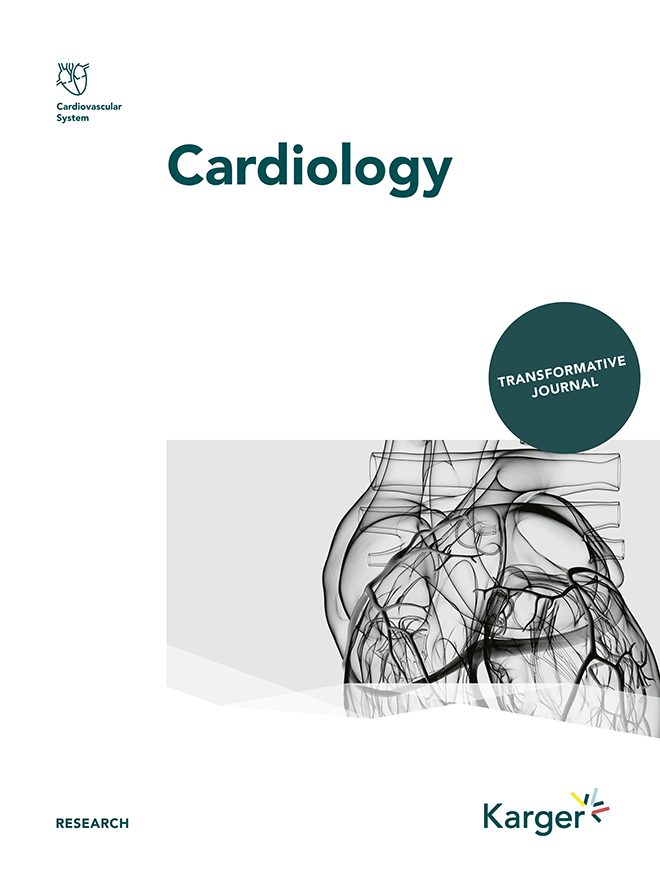
Updates on Cardiovascular Prevention
In an effort to reduce the burden of cardiovascular diseases for individual patients and at a population level, research has been focusing on identifying risk factors, risk classification, and prevention strategies based on individual patient characteristics. Cardiology’s article collection ‘Updates on Cardiovascular Prevention’ aims to bring together recent research and review articles, as well as short communications, particularly on:
- Pharmacotherapy in CVD prevention
- Lifestyle modification and its role in CVD prevention
- The role of cardiovascular rehabilitation
- Adverse pharmacological effects of non-cardiovascular drugs – impact on CV disease
- Co-morbidities in CV disease
- Risk factors and markers in CV disease
Please select the option “Call for Papers: Updates on Cardiovascular Prevention” when submitting your manuscript and mention this Call for Papers in your cover letter.
Cardiology is a Transformative Journal and supports Open Access publications. Corresponding authors can publish Open Access articles at no or reduced cost if they are associated with or employed by one of these universities.
Submit Now Author GuidelinesDan Atar
Oslo University Hospital, Oslo, Norway
November 30, 2023
Impact Factor: 1.9
CiteScore: 2.9
Acceptance Rate: 9%
Time to first decision: 13 days
Vascular Structure and Function in Exercise
The Pulse journal aims to bring together in this article collection research articles, review articles, as well as brief and case reports that focus on furthering our understanding of vascular structure and function in exercise.
Topics of particular interest are:
- Vascular adaptation to exercise
- Vascular function, similarity, and disparity in physical activity versus exercise
- Analyses of the effect of exercise on arteries: arterial hemodynamic versus endothelial function
- Exercise effect on vascular function: different exercise training modalities
- Epidemiology of exercise and vascular function
Please select the option "Call for Papers: Vascular structure and function in exercise" and mention this Call for Papers in your cover letter when submitting.
Karger has established agreements with consortia and institutions that include full or partial coverage of Article Processing Charges (APC). Corresponding authors can publish Open Access articles at no or reduced cost if they are associated with or employed by one of these universities.
Submit Now Author GuidelinesJeong Bae Park
JB lab and clinic, Seoul, South Korea
Guest Editor
Sae Young Jae
University of Seoul, Seoul, South Korea
Email: Editorial Office
January 31, 2024
Time to final decision: 8 weeks
Endocrinology
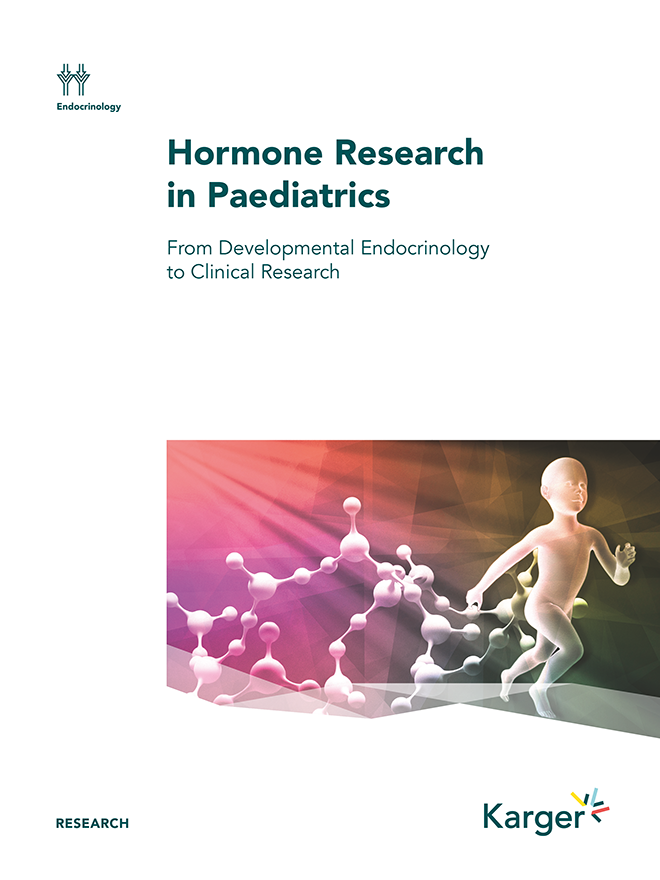
Global Challenges in Paediatric Endocrinology
Hormone Research in Paediatrics is calling for reviews, systematic reviews, brief reports, and research articles to be published in a Special Collection on challenges and advancements in Paediatric Endocrinology.
Authors are welcome to submit articles on the listed topics that will bring new insights to the research community. The articles will be rapidly peer-reviewed.
- Puberty
- Thyroid
- Neonatal Endocrinology
- Electrolyte disorders
- Developmental Origins of Health and Disease
- Bone and Growth
- Paediatric and Adolescent Gynaecology
- Sex Differentiation/DSD
- HPA Axis
- Obesity and Metabolism
Please select the option “Call for Papers: Global Challenges in Paediatric Endocrinology” when submitting your manuscript and mention this Call for Papers in your cover letter.
Hormone Research in Paediatrics supports Open Access publications. Corresponding authors can publish Open Access articles at no or reduced cost if they are associated with or employed by one of these universities.
Submit Now Author GuidelinesStefano Cianfarani
University of Rome Tor Vergata, Rome, Italy
Email: Editorial Office
February 10, 2024
Impact Factor: 3.2
CiteScore: 5.6
Further Areas
The State of Digital Biomarkers and Mental Health
This article collection of the journal Digital Biomarkers, focused on mental health technologies, provides a venue for publishing advances in Digital Biomarkers and phenotypes for mental health. Papers that describe the development, validation, and deployment of theory-driven technologies in digital mental healthcare are encouraged.
Digital biomarkers and phenotypes are emerging as powerful tools for quantifying human health. These approaches, which leverage advances in wearable sensors, mobile technology, and data analytics, enable the discovery of new markers of disease that are well suited for capture and monitoring at scale. Digital biomarkers and phenotypes may be most impactful for mental health conditions, where there is a relative paucity of established objective biomarkers, and the ability to capture measures of disease outside of traditional research or clinical contexts is truly enabling. Conditions where these biomarkers may have the most impact have been identified, with initial focus directed to conditions where symptoms cannot be reported reliably, for episodic conditions, and for conditions with rapidly changing and/or context-dependent symptoms.
Past efforts in digital mental healthcare have focused on delivering traditional in-person assessment and interventions accessibly such as web- or phone-based talk therapy and/or telehealth video-consulting. While making great gains in service accessibility, these efforts inherently carry similar limitations to in-person interventions, such as poor user engagement and requirement for reliable reporting and trained clinicians. Digital biomarkers and phenotypes for mental health conditions could diminish these limitations, offering new tools to detect, monitor, and give feedback on mental health symptoms to users and their providers alike. Importantly, there is a distinct lack of rigorous validation of digital mental health tools. Thus, there is a critical and unmet need for validated digital biomarkers and phenotypes that enable objective and remote mental health assessments across the lifespan. Researchers from groups throughout the world are working to address this critical unmet need.
Please select the option “Call for Papers: The State of Digital Biomarkers and Mental Health” when submitting your manuscript and mention this Call for Papers in your cover letter.
Karger has established agreements with consortia and institutions that include full or partial coverage of Article Processing Charges (APC). Corresponding authors can publish Open Access articles at no or reduced cost if they are associated with or employed by one of these universities.
Submit Now Author GuidelinesRoozbeh Ghaffari
Northwestern University, Evanston, IL, USA
Guest Editors
Ryan S. McGinnis
Wake Forest University School of Medicine, Winston-Salem, NC, USA
Ellen W. McGinnis
Wake Forest University School of Medicine, Winston-Salem, NC, USA
Email: Editorial Office
October 16, 2023
CiteScore: 10.9
Time to first decision: 11 days
Time to final decision: 33 days
Gastroenterology
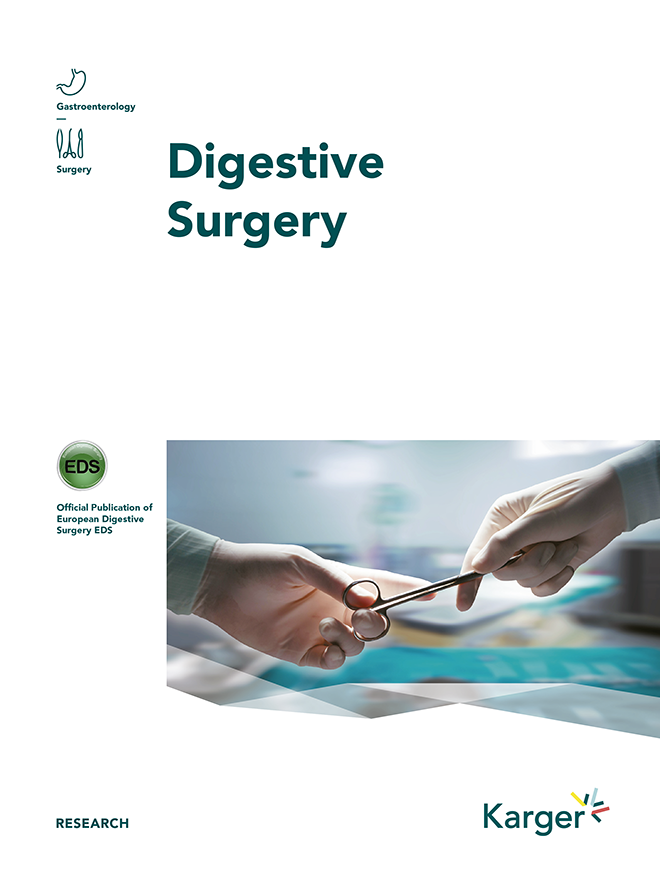
Article Collections of Digestive Surgery
We welcome the submission of Research, Review, Brief Report, and Methods articles to the following article collections:
- Treatment of Complications in Digestive Surgery
- Colorectal Cancer
- Upper Gastrointestinal Tract (GI) Cancers
- Hepato-Pancreato-Biliary (HPB) Cancers
- Rare Cancers of the Gastrointestinal Tract and Peritoneum
Please mention the article collection title in your Cover Letter when submitting your article. We look forward to receiving your manuscript.
Submit Now Author GuidelinesRoberto Salvia
University of Verona, Verona, Italy
Mark I. van Berge Henegouwen
Amsterdam UMC / University of Amsterdam / Cancer Centre Amsterdam, Amsterdam, The Netherlands
Open
Impact Factor: 2.7
CiteScore: 5.2
Time to final decision: 7 weeks
Online after acceptance: 18 days
Article Collections of Inflammatory Intestinal Diseases
We welcome the submission of Research, Review, Systematic Review, Brief Report, and Methods articles to the following article collections:
- Disease Monitoring, Including Biomarkers and Advanced Imaging Modalities in Inflammatory Bowel Disease (IBD)
- Short- and Long-term Real-World Outcomes of Advanced Therapies for Inflammatory Bowel Disease (IBD)
- Eosinophilic Oesophagitis
- Coeliac Disease and Non-Coeliac Gluten Sensitivity
Please mention the article collection title in your Cover Letter when submitting your article. We look forward to receiving your manuscript.
Submit Now Author GuidelinesOpen
CiteScore: 4.2
Acceptance Rate: 69%
Time to final decision: 13 weeks
Time manuscript received to accepted: 14 weeks
General Medicine
Advances in Palliative Care
As an interdisciplinary “hub”, the Biomedicine Hub journal aims to highlight recent advances in palliative care and the importance of an interdisciplinary approach to improving the quality of life of patients with life-threatening diseases. For this article collection the journal will consider research articles, review articles, evidence-based protocols, as well as case reports and brief reports.
Topics of particular interest are:
- model palliative care programs
- medical advances in pain and symptom management
- ways of improving the understanding of the illness and its progression
- how to help patients to cope with feelings and changes related to the illness
- ways of assisting in understanding treatment options, making treatment decisions, and coordinating care
Please select the option “Call for Papers: Advances in Palliative Care” when submitting your manuscript and mention this Call for Papers in your cover letter.
Karger has established agreements with consortia and institutions that include full or partial coverage of Article Processing Charges (APC). Corresponding authors can publish Open Access articles at no or reduced cost if they are associated with or employed by one of these universities.
Journal Home Author GuidelinesEmail: Editorial Office
The submission deadline has passed. To submit your manuscript to this collection, please contact the Editorial Office.
Genetics
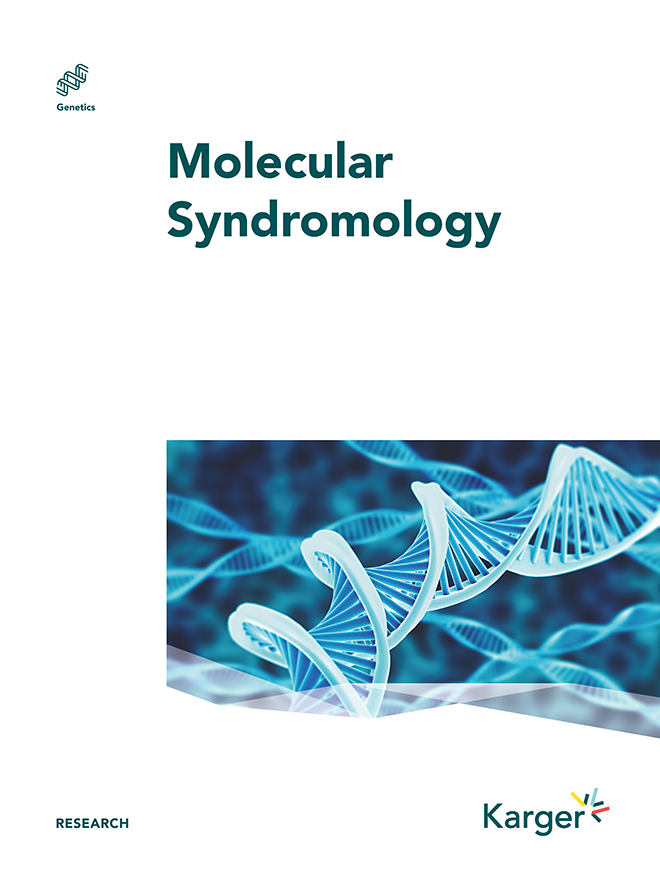
Genetic and Clinical Characterization of Genes Associated with Novel Genetic Disorders
We invite original research on the identification and characterization of novel genetic disorders using next-generation sequencing and other advanced technologies. The topics of interest include neurodevelopmental disorders, genetic skeletal disorders, rare skin disorders, infertility, and complex syndromes, as well as high-throughput technologies, new therapeutic approaches, gene editing and genomics, and GWAS. Join us in advancing our understanding of the genetic basis of human health and disease.
Please select the option “Call for Papers: Genetic and clinical characterization of genes associated with novel genetic disorders” when submitting your manuscript and mention this Call for Papers in your cover letter.
Molecular Syndromology supports Open Access publications. Corresponding authors can publish Open Access articles at no or reduced cost if they are associated with or employed by one of these universities.
Submit Now Author GuidelinesMartin Poot
Department of Human Genetics, University of Würzburg, Germany
Guest Editors
Umair Muhammad
Medical Genomics Research Department, King Abdullah International Medical Research Center, Saudi Arabia
Muhammad Muaaz Aslam
School of Public Health University of Pittsburgh, US
Email: Editorial Office
December 31, 2023
Impact Factor: 1.1
CiteScore: 2.6
Acceptance Rate: 45%
Geriatrics and Gerontology
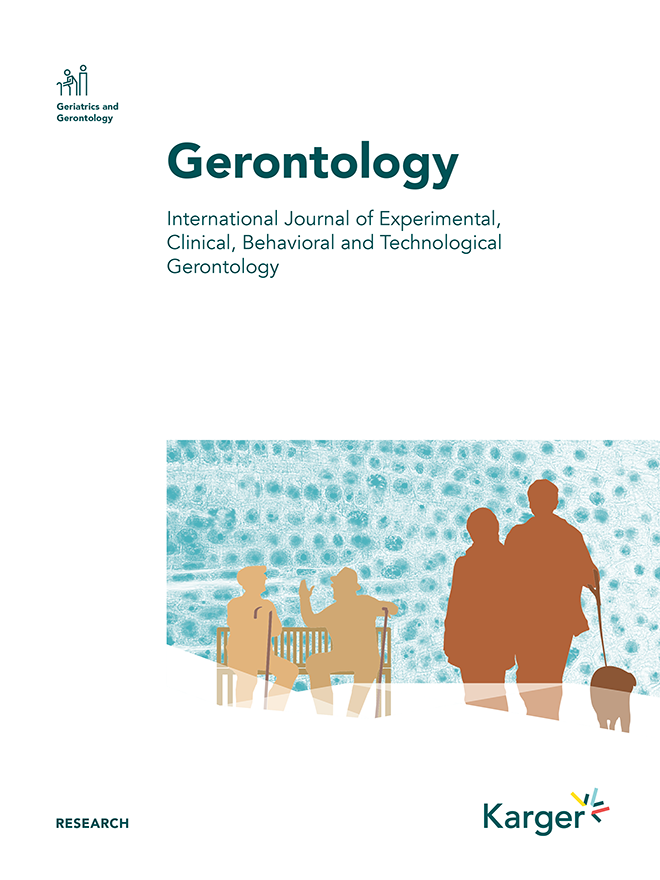
Regenerative Medicine for Aging
The journal Gerontology solicits papers in the field of regenerative medicine.
The human life span has almost doubled in the past 70 years; however, the number of disease-free years has not kept pace. Chronic, age-related diseases often characterize the last decade of life, and affect its quality. Extending longevity in good health is essential to increase the quality of life of aged people and diminish the cost burden to society.
The Regenerative section of Gerontology welcomes research papers focusing on new solutions for increasing health span via regenerative approaches and anti-senescent investigation. Topics covered include but are not limited to:
- Nutrition therapies
- Medical weight loss therapies
- Hormone replacement therapies
- Stem cell therapies
- Tissue engineering
- Immunomodulation therapy
Please select the option “Call for Papers: Regenerative Medicine for Aging” when submitting your manuscript and mention this Call for Papers in your cover letter.
Gerontology supports Open Access publications. Corresponding authors can publish Open Access articles at no or reduced cost if they are associated with or employed by one of these universities.
Submit Now Author GuidelinesTamas Fulop
University of Sherbrooke, Division of Geriatrics, Sherbrooke, Canada
Email: Editorial Office
December 21, 2023
Impact Factor: 3.5
CiteScore: 7.4
Immunology and Allergy
Immunometabolism
The impact of immunometabolites in the pathogenesis of infection is increasingly appreciated. In this focused issue of the Journal of Innate Immunity we are showcasing articles that illustrate the varied roles of immunometabolites in viral and bacterial infection. We hope to include both primary research and reviews that detail how both host and pathogen metabolites affect immune responses. Studies on the immunometabolic responses to viral infections, especially SARS CoV2 and influenza, are encouraged. Bacterial infection due to intracellular pathogens such as M. tuberculosis and Salmonellae as well as predominantly extracellular pathogens including S. aureus and S. pneumoniae will be included.
Please select the option “Call for Papers: Immunometabolism” when submitting your manuscript and mention this Call for Papers in your cover letter.
Karger has established agreements with consortia and institutions that include full or partial coverage of Article Processing Charges (APC). Corresponding authors can publish Open Access articles at no or reduced cost if they are associated with or employed by one of these universities.
Submit Now Author GuidelinesCatherine M. Greene
RCSI, Beaumont Hospital, Dublin, Ireland
Emer Reeves
RCSI, Beaumont Hospital, Dublin, Ireland
Guest Editors
Alice S. Prince
Columbia University Medical Center, New York, NY, USA
Roi Avraham
Weizmann Institute of Science, Rehovot, Israel
Email: Editorial Office
September 15, 2023
Impact Factor: 5.3
CiteScore: 12.6
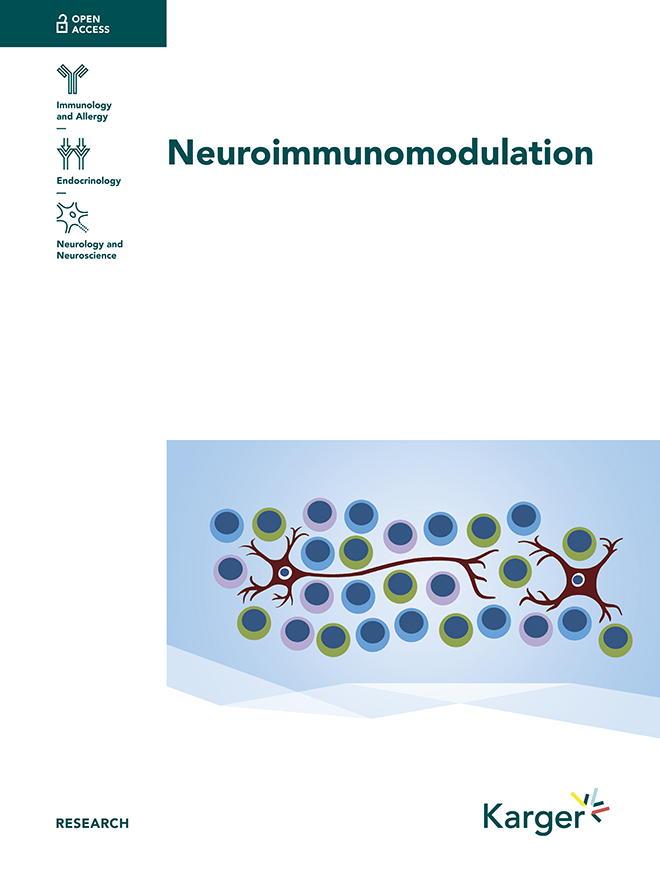
COVID-19, Hormones and Brain
In the pathogenesis and the progression of COVID-19, Involvement of gender (sex hormones), secosteroids (Vitamin D), glucocorticoids (used for therapy, but also since altered by stress of the disease), together with other nonsteroidal hormones, and neuroendocrine pathways are recognized as critical pathophysiological factors.
A pioneer issue of Neuroimmunomodulation is now dedicated to “COVID-19, Hormones and Brain”. It will show an article collection on this topic from basic and clinical science, that helps to understand this fundamental aspect.
Potential authors are invited to submit articles that will be rapidly peer reviewed. The article should demonstrate crosstalk between hormones and viral infection in the context of COVID-19.
Please mention the Call for Paper in your Cover Letter when submitting.
Submit Now Author GuidelinesProfessor Rainer H. Straub
University Hospital, Laboratory of Experimental Rheumatology and Neuroendocrine Immunology, Regensburg, Germany
Guest Editor
Maurizio Cutolo, University of Genova, Genova, Italy
Open
Impact Factor: 2.4
CiteScore: 4.1
Acceptance Rate: 46%
Time to final decision: 10 weeks
Nephrology
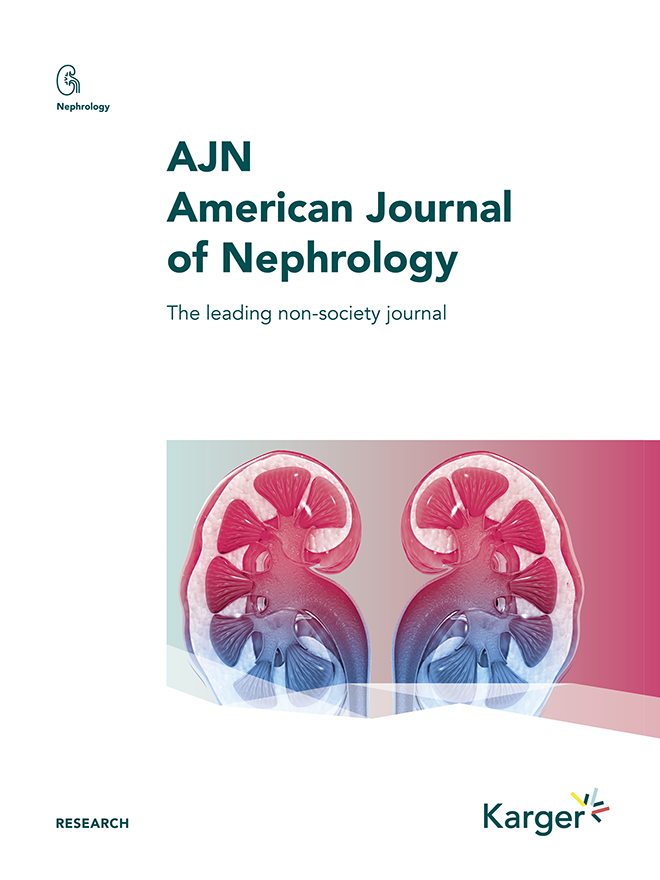
New Insights in Onconephrology
American Journal of Nephrology aims to dedicate an article collection to recent advancements in onconephrolgy. Authors are welcome to submit research articles and reviews that present novel concepts and insights to the research community as well as highlight the controversies that need future research.
Topics of particular interest include but are not limited to:
- Renal cell carcinoma
- CKD, AKI and glomerular diseases in patients with cancer
- Kidney functions in patients with cancer
- Kidney disease in stem cell transplantation
- Clinical surveillance and management strategies for drug-induced and cancer immunotherapies nephrotoxicity (ICI, CAR-T, urinary T-cells and serum biomarkers)
- Electrolyte disorders in patients with cancer
- Therapeutics and diagnostics in onconephrology
- Epidemiology of risk, disease presentation, and treatment effects in onconephrology
Submitted articles will be rapidly peer-reviewed and published online within a few days from acceptance.
Please select the option “New Insights in Onconephrology” when submitting your manuscript and mention this Call for Papers in your cover letter.
American Journal of Nephrology supports Open Access publications. Corresponding authors can publish Open Access articles at no or reduced cost if they are associated with or employed by one of these universities.
Submit Now Author GuidelinesGeorge L. Bakris
University of Chicago Medicine, Chicago, US
Email: Editorial Office
March 31, 2024
Impact Factor: 4.2
CiteScore: 7.8
Time to first decision: 7 days
Time manuscript received to accepted: 8 weeks
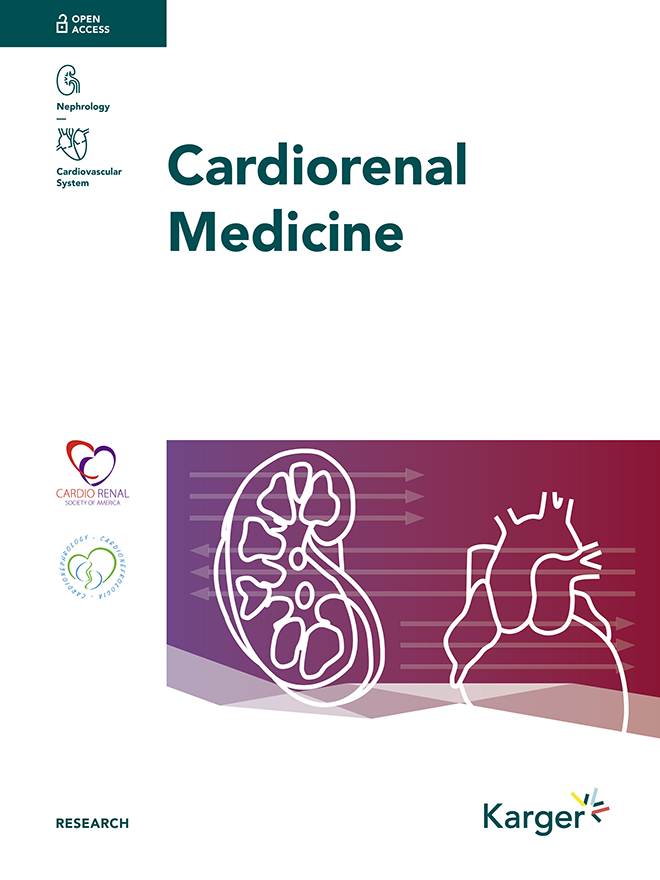
Emerging Cardiorenal Concepts and Controversies
The pathophysiologic pathways linking cardiovascular disease and kidney dysfunction are complex and have been the focus of intense investigations over the past several years. There have been significant advances in our understanding of these mechanisms and several therapeutic agents have also been introduced.
The goal of this Call for Papers is to bring together articles related to interactions between the heart and the kidney in a variety of settings with special emphasis on the novel concepts as well as the controversies that need future research. For this article collection "Emerging Cardiorenal Concepts and Controversies", the journal will consider original research articles, brief reports, and review articles focusing on, but not limited to, the following topics:
- Hypertension in heart failure
- Biomarkers in heart failure and cardiorenal syndrome
- Kidney-heart transplant in cardiorenal syndrome
- Kidney in advanced heart failure
- Diuretic resistance and decongestive strategies in heart failure
- Precision medicine and cardiorenal syndrome
Please select the option “Call for Papers: Emerging Cardiorenal Concepts and Controversies” when submitting your manuscript and mention this Call for Papers in your cover letter.
Karger has established agreements with consortia and institutions that include full or partial coverage of Article Processing Charges (APC). Corresponding authors can publish Open Access articles at no or reduced cost if they are associated with or employed by one of these universities.
Submit Now Author GuidelinesAdam T. Whaley-Connell
University of Missouri, Columbia, USA
Claudio Ronco
St Bartolo Hospital, Vicenza, Italy
Guest Editor
Amir Kazory
University of Florida, Gainesville, USA
Email: Editorial Office
March 31, 2024
Impact Factor: 3.8
CiteScore: 5.0
Acceptance Rate: 23%
Time to first decision: 25 days
Time manuscript received to accepted: 8 weeks

Fluid Overload in Cardiorenal Medicine: From “Bench to Bedside”
The phenomenon of volume overload has received considerable attention in cardiorenal research in recent years. In the current Special Collection of Cardiorenal Medicine, we welcome researchers to submit their original work that contributes to a deeper understanding of this complex process. We welcome manuscripts that address various aspects, ranging from the underlying pathophysiology to clinical challenges, including but not limited to diagnosis, risk assessment, novel biomarkers, monitoring, and management. Through these contributions, we aim to enrich the existing body of knowledge on volume overload and its multifaceted implications in cardiorenal syndrome.
Please select the option “Call for Papers: Fluid overload in Cardiorenal Medicine: From “bench to bedside” when submitting your manuscript and mention this Call for Papers in your cover letter.
Karger has established agreements with consortia and institutions that include full or partial coverage of Article Processing Charges (APC). Corresponding authors can publish Open Access articles at no or reduced cost if they are associated with or employed by one of these universities.
Submit Now Author GuidelinesAdam T. Whaley-Connell
University of Missouri, Columbia, USA
Claudio Ronco
St Bartolo Hospital, Vicenza, Italy
Guest Editors
Julio Núñez
Hospital Clínico Universitario de Valencia, Valencia, Spain
Marta Cobo
Hospital Universitario Puerta de Hierro Majadahonda (IDIPHISA), Madrid, Spain
Email: Editorial Office
May 31, 2024
Impact Factor: 3.8
CiteScore: 5.0
Acceptance Rate: 23%
Time to first decision: 25 days
Time manuscript received to accepted: 8 weeks
Advances in Diabetic Kidney Diseases
Glomerular Diseases is a first-in-class open access peer-reviewed journal focusing exclusively on the glomerulus with the overarching purpose to disseminate cutting-edge clinical knowledge and expertise in all areas of basic and clinical science relevant to the glomerulus to accomplish precision medicine for patients with glomerular diseases.
In recognition of the robust novel treatment options for diabetic kidney diseases, Glomerular Diseases plans a Special Collection on “Advances in Diabetic Kidney Disease (DKD)”. Authors are welcome to submit original research, case series, state-of-the-art reviews, case reports of unique value, and opinion pieces reporting advances in DKD in the areas of:
- Novel pathogenetic insights
- Future treatments
- DKD prognostic indices
- Relationship between DKD and cardiovascular disease
- Cellular mechanisms of SGLT2i in attenuation of DKD
- Gut microbiota in DKD
- Animal models
- Serum and urine biomarkers
- MicroRNAs in DKD pathogenesis and treatment
- DKD "Omics": Proteomics, Pepdidomics, Metabolomics, Genomics
Glomerular Diseases releases accepted manuscripts in a continuous fashion upon acceptance after peer-review.
Please select the option “Call for Papers: Advances in Diabetic Kidney Diseases” when submitting your manuscript and mention this Call for Papers in your cover letter.
Karger has established agreements with consortia and institutions that include full or partial coverage of Article Processing Charges (APC). Corresponding authors can publish Open Access articles at no or reduced cost if they are associated with or employed by one of these universities.
Submit Now Author GuidelinesSharon Adler
UCLA Medical Center, Torrence, USA
Cynthia Nast
Cedars-Sinai Medical Center, Los Angeles, USA
Email: Editorial Office
May 31, 2024
Indexed in DOAJ and PubMed
Affiliated with the International Society of Glomerular Disease (ISGD)
Kidney Function and Omics Science
The advent of the omics sciences is changing our knowledge in the medical field. Omics are acquiring great importance in defining the pathogenesis, helping the diagnosis and devising new therapies for many diseases. The possibility to conduct omics investigations at the single cell level and, with the advent of space omics, to reconstruct the entire function of an organ are truly revolutionizing the medical field. The kidney, with its complex anatomical architecture and its profound cellular differentiation, can greatly benefit from these new technologies.
This call for papers aims to collect research articles and reviews describing how omics technologies are changing our knowledge of renal function and the repercussions they have in the field of physiopathology, diagnostics, and therapy of renal diseases. Topics of particular interest are:
- Application of omics approaches in rare renal diseases
- Characterization of urinary extracellular vesicles
- Characterization of urine-derived renal progenitors
- Single cell transcriptomics of normal and diseased renal cells
- Spatial genomics and proteomics of normal and diseased renal cells
Please select the option “Call for Papers: Kidney Function and Omics Science” when submitting your manuscript and mention this Call for Papers in your cover letter.
Karger has established agreements with consortia and institutions that include full or partial coverage of Article Processing Charges (APC). Corresponding authors can publish Open Access articles at no or reduced cost if they are associated with or employed by one of these universities.
Submit Now Author GuidelinesGiovanbattista Capasso
University of Campania Luigi Vanvitelli, Naples, Italy
Email: Editorial Office
December 20, 2023
Impact Factor: 2.8
CiteScore: 5.1
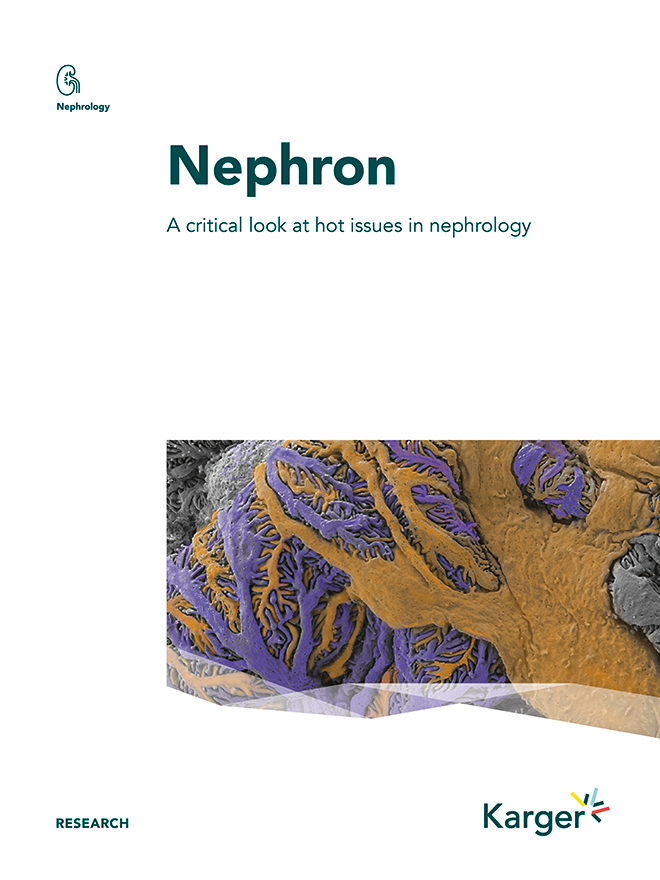
Genetics and Epigenetics of Renal Ciliopathies
Renal ciliopathies are a clinically and genetically heterogeneous group of disorders with widely varying manifestations, from in utero symptoms to clinically silent disease until adulthood. The group includes autosomal dominant and recessive polycystic kidney diseases, nephronophthisis, medullary cystic kidney disease, as well as less frequent cilia-related disorders.
The goal of this Call for Papers is to dedicate an article collection to emerging insights on cystic kidney disease phenotypes and the underlying genetic and epigenetic determinants. We will consider original research articles, brief reports, case reports, and review articles focusing on, but not strictly limited to, the following topics:
Topics of particular interest are:
- Identification of novel and/or complex genetic abnormalities in renal ciliopathies
- Epigenetic mechanisms in the pathogenesis of PKD
- Novel findings exploring the relation between genotype and disease phenotype
- Description of novel ciliopathy syndromes
- Cohort studies describing the impact of genetic background on the response to therapies
- In vitro and in vivo models to validate and characterize candidate ciliopathy genes and to test new therapies
Please select the option "Call for Papers: Genetics and Epigenetics of Renal Ciliopathies" when submitting your manuscript and mention this Call for Papers in your cover letter.
Nephron supports Open Access publications. Corresponding authors can publish Open Access articles at no or reduced cost if they are associated with or employed by one of these universities.
Submit Now Author GuidelinesAriela Benigni
Mario Negri Institute for Pharmacological Research, Bergamo, Italy
Guest Editors
Laura Massella
Bambino Gesù Children’s Hospital, Rome, Italy
Marina Noris
Istituto di Ricerche Farmacologiche Mario Negri IRCCS, Clinical Research Center for Rare Diseases “Aldo e Cele Daccò”, Ranica, Italy
Email: Editorial Office
November 30, 2023
Impact Factor: 2.5
CiteScore: 6.1
Acceptance Rate: 25%
Time to first decision: 21 days
Time manuscript received to accepted: 13 weeks
Neurology and Neuroscience
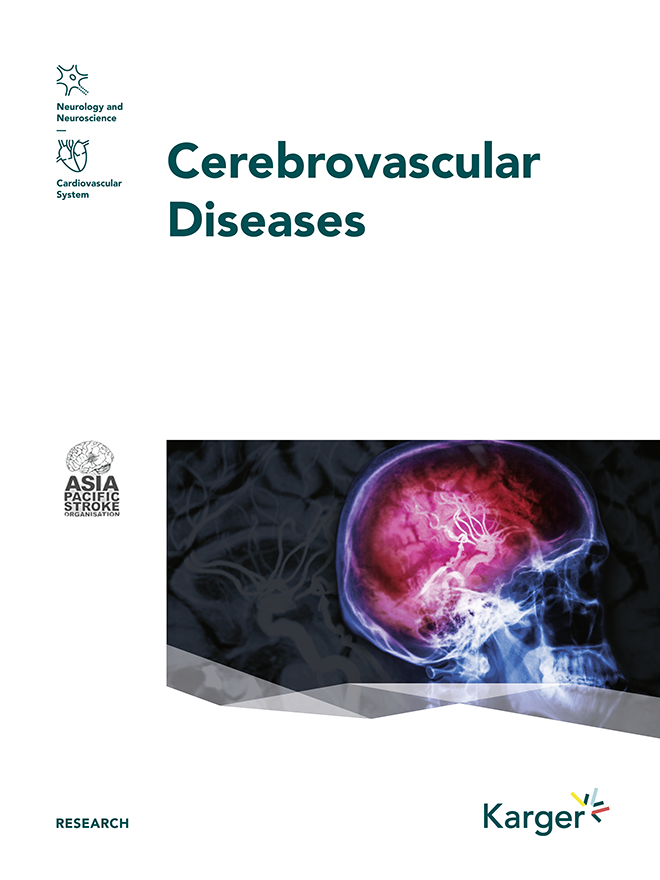
Sex and Gender Disparities in Stroke
Cerebrovascular Diseases journal is pleased to announce that it will publish papers and an article collection on “Sex and Gender Disparities in Stroke”.
Despite recent landmark achievements in stroke research and treatment, there remains a pressing need to address the sex and gender disparities associated with stroke incidence, treatment outcomes, and access to healthcare. This call for papers has a broad scope, and we invite researchers, clinicians, public health experts, and other stakeholders to submit their original research articles, brief reports, review articles, and letters presenting a perspective to deepen the understanding of sex and gender disparities in stroke. We particularly welcome submissions from low- and middle-income countries where sex-disaggregated stroke data are lacking, as well as insights into disparities faced by the LGBTQI community affected by stroke. Additionally, we value the sharing of local and regional experiences in this field and encourage proposals for evidence-based approaches to mitigate these inequalities.
Topics of interest:
- State-of-the-art reviews of the current landscape of sex and gender disparities in stroke
- Sex and gender-specific risk factors and social determinants contributing to variations in stroke epidemiology
- Preventive measures tailored to women's specific needs, including awareness of stroke, lifestyle interventions, medications, and health promotion initiatives
- Differences in timely diagnosis, access to medical treatment, use of therapeutic interventions, and access to post-stroke rehabilitation
- Sex and Gender disparities on functional recovery, quality of life, and mortality
- Sex and Gender-sensitive healthcare policies to reduce disparities in stroke prevention, treatment, and long-term care
Please select the option “Call for Papers: Sex and Gender Disparities in Stroke” when submitting your manuscript and mention this Call for Papers in your cover letter.
Cerebrovascular Diseases supports Open Access publications. Corresponding authors can publish Open Access articles at no or reduced cost if they are associated with or employed by one of these universities.
Submit Now Author GuidelinesCraig S. Anderson
The George Institute for Global Health, Sydney, NSW, Australia
Ana Claudia de Souza
Hospital Moinhos de Vento, Porto Alegre, Brazil
Cheryl Carcel
The George Institute for Global Health, Newtown, NSW, Australia
Email: Editorial Office
December 15, 2023
Impact Factor: 2.9
CiteScore: 4.8
Acceptance Rate: 21%
Time to first decision: 16 days
Time manuscript received to accepted: 10 weeks

Advances in the Management of Intracranial Hemorrhage
The journal Cerebrovascular Diseases is calling for papers for an article collection entitled “Advances in the Management of Intracranial Hemorrhage” which aims to bring together recent research and review articles, as well as brief reports, focusing on, but not strictly limited to, the following topics:
- Epidemiology and Genetics of ICH
- Imaging of ICH
- Hyperacute Medical Management of ICH
- Reversal of OAC - related ICH
- ICH Recovery and Rehabilitation
Please select the option “Call for Papers: Advances in the Management of Intracranial Hemorrhage” when submitting your manuscript and mention this Call for Papers in your cover letter.
Cerebrovascular Diseases supports Open Access publications. Corresponding authors can publish Open Access articles at no or reduced cost if they are associated with or employed by one of these universities.
Submit Now Author GuidelinesCraig S. Anderson
The George Institute for Global Health, Sydney, NSW, Australia
Email: Editorial Office
December 20, 2023
Impact Factor: 2.9
CiteScore: 4.8
Acceptance Rate: 21%
Time to first decision: 16 days
Time manuscript received to accepted: 10 weeks
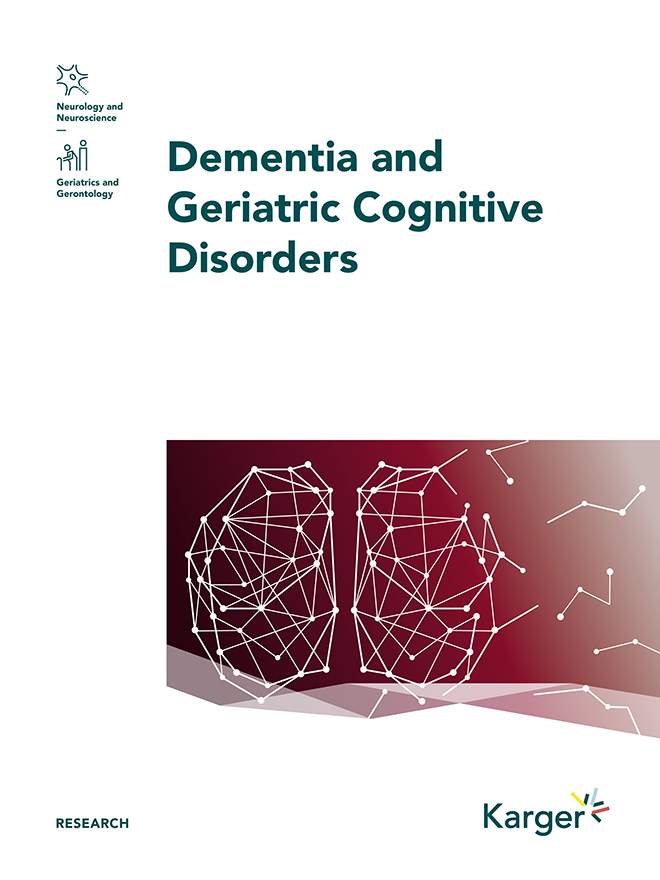
Enhancing Ethnocultural Diversity and Under-Represented Groups in Dementia Research
Alzheimer’s disease involves a multitude of risk and protective factors encompassing genetics and lived experiences. Ethnoculturally diverse individuals from under-represented groups (URGs), including Black/African American and Hispanic/Latinx individuals in the United States and globally, are disproportionally at greater risk of Alzheimer’s disease. Further, physiological ethno-racial differences are observed, such as the amyloid (A), tau (T), and neurodegeneration (N) biomarkers used in the current diagnostic criteria for Alzheimer’s disease. Despite these recognized disease heterogeneities, recruitment of under-represented groups lags in basic research, clinical trials and dementia prevention studies.
Recognizing the gap in communication that exists between minority populations and Alzheimer’s disease research community, education and outreach are a critical step in addressing these disparities. We are calling for articles to highlight studies into under-represented groups ranging from basic genetic and biomarker research to innovative strategies for successful recruitment. These studies will provide data relevant to specific populations, which when taken together, can also provide fundamental insights into the causes and treatments of dementia.
This call for articles aims to collect articles describing the latest developments in the research of URGs. We will consider original research articles, brief reports, protocols and review articles focusing on, but not strictly limited to, the following topics:
- Biomarker, neuroimaging, genomic studies of URGs
- Approaches to enhance recruitment of URGs
- Pharmacogenomic response to treatments and medications of URGs
Please select the option “Call for Papers: Under-represented groups in dementia research” when submitting your manuscript and mention this Call for Papers in your cover letter.
Dementia and Geriatric Cognitive Disorders supports Open Access publications. Corresponding authors can publish Open Access articles at no or reduced cost if they are associated with or employed by one of these universities.
Submit Now Author GuidelinesJohn B. Kwok
Neuroscience Research Australia, Sydney, Australia
June 30, 2024
Impact Factor: 2.4
CiteScore: 4.7
Acceptance Rate: 36%
Time to first decision: 28 days
Time to final decision: 7 weeks

Harnessing Smart Technologies to Enhance Translation of Dementia Research from Bench to Bedside
The rapid improvement in smart technologies have generated a multitude of applications for dementia research and care, ranging from remote diagnosis to health delivery. Technologies include established modalities such as smartphones and tablets, which provide access to personal computing and associated capabilities. Further, wearables, smart home systems, robots, virtual reality and artificial intelligence are also enabling the development of targeted strategies to deliver care for those living with dementia.
This call for articles aims to collect articles describing the latest developments in the research and implementation of these technologies. We will consider original research articles, brief reports, protocols and review articles focusing on, but not strictly limited to, the following topics:
- Application of digital platforms to aid in remote diagnoses of neurodegeneration
- Identification of novel digital biomarkers that can be translated to remote diagnoses
- Use of smart technologies to enhance at-home care for patients
Please select the option “Call for Papers: Harnessing smart technologies to enhance translation of dementia research from bench to bedside” when submitting your manuscript and mention this Call for Papers in your cover letter.
Dementia and Geriatric Cognitive Disorders supports Open Access publications. Corresponding authors can publish Open Access articles at no or reduced cost if they are associated with or employed by one of these universities.
Submit Now Author GuidelinesJohn B. Kwok
Neuroscience Research Australia, Sydney, Australia
March 30, 2024
Impact Factor: 2.4
CiteScore: 4.7
Acceptance Rate: 36%
Time to first decision: 28 days
Time to final decision: 7 weeks
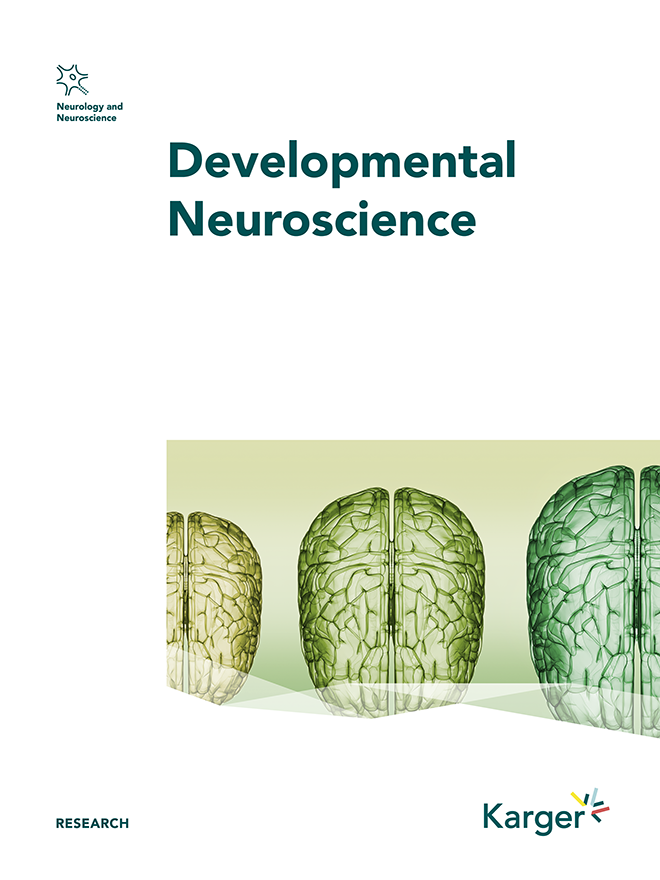
New Insights into the Formation of Neural Circuits
The journal Developmental Neuroscience solicits papers on the mechanisms leading to physiological or aberrant neural circuit formation.
Topics covered include but are not limited to:
- Distinct neuronal subtypes and wiring specificity
- Formation of dendritic arbors and spines
- Axonal pathfinding, targeting, and branching
- Role of glial cells in circuit development
- Synaptogenesis and synapse elimination
- Aberrant circuit formation
Please select the option “Call for Papers: New insights into the formation of neural circuits” when submitting your manuscript and mention this Call for Papers in your cover letter.
Developmental Neuroscience is a Subscribe to Open (S2O) journal, aiming to achieve Open Access without cost to authors or readers. Authors submitting in 2023 can publish open access Open Access without any charges.
Submit Now Author GuidelinesDecember 23, 2023
Impact Factor: 2.9
CiteScore: 5.0
Time to final decision: 10 weeks

Role of Microglia in Brain Development
The journal Developmental Neuroscience solicits papers on the role of microglia in brain development.
Topics covered include but are not limited to:
- Microglial effects on progenitor cells
- Microglial modulation of neuronal positioning and wiring
- Microglial support of vascular formation and integrity
- Synaptic pruning by microglia
- Effects of impaired microglial function on brain development
Please select the option “Call for Papers: Role of microglia in brain development” when submitting your manuscript and mention this Call for Papers in your cover letter.
Developmental Neuroscience is a Subscribe to Open (S2O) journal, aiming to achieve Open Access without cost to authors or readers. Authors submitting in 2023 can publish Open Access without any charges.
Submit Now Author GuidelinesDecember 23, 2023
Impact Factor: 2.9
CiteScore: 5.0
Time to final decision: 10 weeks
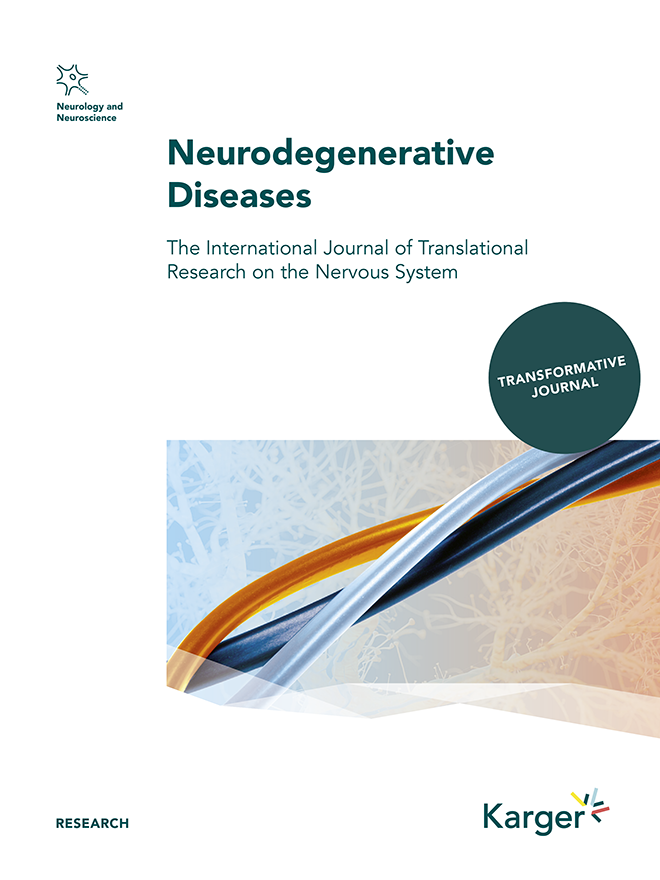
Anti-amyloid Drugs: A Therapeutical Revolution in Alzheimer’s Disease
Anti-amyloid drugs are becoming available to slow-down cognitive decline for Alzheimer’s disease, however this comes with serious medical, economic, and ethical considerations. Recent concerns about safety, particularly in patients with cerebral amyloid angiopathy and specific genotypes, also raise the question of appropriate early patient selection and exclusion. We are calling for contributions to an article collection dedicated to emerging insights on clinical and research question that may guide the future of these therapeutics in AD. We will consider original research articles, brief reports, and review articles focusing on, but not strictly limited to, the following topics:
- Biological mechanisms of action of anti-amyloid drugs
- Epidemiological studies addressing the critical issue of patient selection
- Economic implication and healthcare system planning
- Advanced neuroimaging techniques with a specific focus on amyloid-related imaging abnormalities (ARIA)
The accepted papers will be published in an article collection in Neurodegenerative Diseases entitled “Anti-amyloid drugs: a therapeutical revolution in Alzheimer’s disease.”
Please select the option “Call for Papers: Anti-amyloid drugs: a therapeutical revolution in Alzheimer’s disease” when submitting your manuscript and mention this Call for Papers in your cover letter.
Neurodegenerative Diseases is a Transformative Journal and supports Open Access publications. Corresponding authors can publish Open Access articles at no or reduced cost if they are associated with or employed by one of these universities.
Submit Now Author GuidelinesGilles Allali
Lausanne University Hospital, Lausanne, Switzerland
Marwan N. Sabbagh
Barrow Neurological Institute, Phoenix, Arizona, USA
Giovanni B. Frisoni
Geneva University Hospitals, Geneva, Switzerland
Email: Editorial Office
December 15, 2023
Impact Factor: 3.0
CiteScore: 4.3
Acceptance Rate: 29%
Time to final decision: 8 weeks
Online after acceptance: 13 days
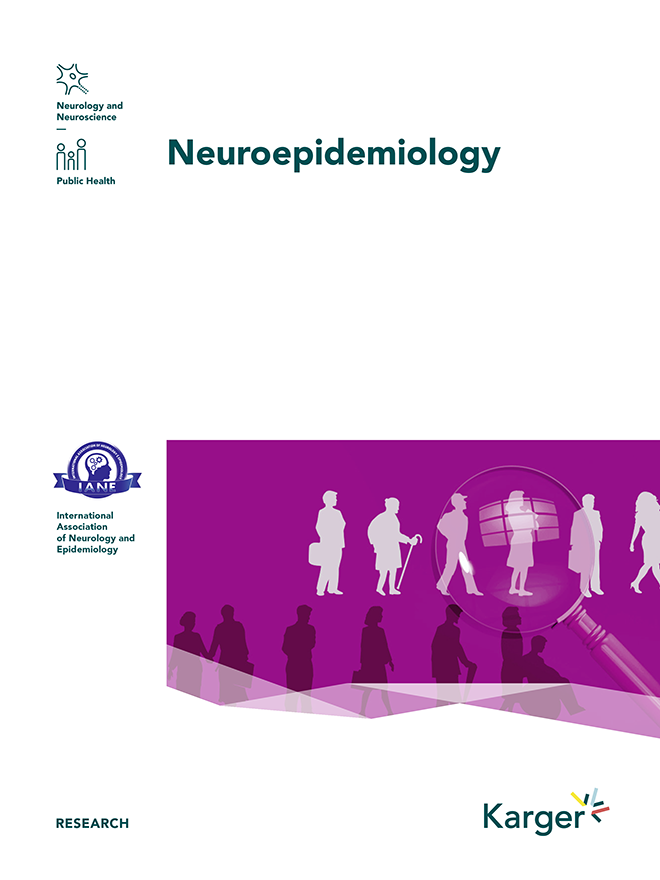
Neuroepidemiology in Africa
Neuroepidemiology is calling for reviews, systematic reviews, brief reports, and research articles to be published in a special article collection entitled "Neuroepidemiology in Africa".
Potential authors are invited to submit articles of topics mentioned above that will be rapidly peer reviewed. Please mention the Call for Paper in your Cover Letter when submitting.
Please select the option “Call for Papers: Neuroepidemiology in Africa” when submitting your manuscript and mention this Call for Papers in your cover letter.
Neuroepidemiology supports Open Access publications. Corresponding authors can publish Open Access articles at no or reduced cost if they are associated with or employed by one of these universities.
Submit Now Author GuidelinesValery L. Feigin
Auckland University of Technology, Auckland, New Zealand
Guest Editors
Dr. Pierre-Marie Preux
Institute of Neuroepidemiology and Tropical Neurology, Limoges, France
Dr. Giancarlo Logroscino
University of Bari, Bari, Italy
Dr. Raj Kalaria
Newcastle University, Newcastle, UK
Email: Editorial Office
December 20, 2023
Impact Factor: 5.7
CiteScore: 8.5
Acceptance Rate: 28%
Time to first decision: 17 days
Time manuscript received to accepted: 10 weeks

Costs of Neurological Disorders
Neurological disorders have become the leading cause of deaths and disabilities combined, but their societal costs (direct and indirect) remain largely unexplored. However, knowing the costs of neurological disorders (separate disorders and all such disorders combined) on the national, regional, and global levels is of great importance for health care planning and resource allocation. We are calling for review, analytic, and methodology papers on the costs of neurological disorders (including projections of the costs in the near 20-30 years) for an article collection in Neuroepidemiology entitled “Costs of Neurological Disorders”.
Potential authors are invited to submit articles on topics mentioned above that will be rapidly peer-reviewed.
Please select the option "Call for Papers: Costs of Neurological Disorders" when submitting your manuscript and mention this Call for Papers in your cover letter.
Neuroepidemiology supports Open Access publications. Corresponding authors can publish Open Access articles at no or reduced cost if they are associated with or employed by one of these universities.
Submit Now Author GuidelinesValery L. Feigin
Auckland University of Technology, Auckland, New Zealand
Guest Editors
Dominique Cadilhac
School of Clinical Sciences at Monash Health, Monash University, Australia
Ajay Mahal
Nossal Institute for Global Health, Melbourne School of Population and Global Health, University of Melbourne, Australia
Email: Editorial Office
November 15, 2023
Impact Factor: 5.7
CiteScore: 8.5
Acceptance Rate: 28%
Time to first decision: 17 days
Time manuscript received to accepted: 10 weeks

Epidemiology of Sleep Disorders in Neurology
Neuroepidemiology is calling for reviews, systematic reviews, brief reports, and research articles to be published in a special article collection entitled Epidemiology of Sleep Disorders in Neurology.
Potential authors are invited to submit articles on topics mentioned above that will be rapidly peer-reviewed.
Please select the option "Call for Paper: Epidemiology of Sleep Disorders in Neurology" when submitting your manuscript and mention this Call for Papers in your cover letter.
Neuroepidemiology supports Open Access publications. Corresponding authors can publish Open Access articles at no or reduced cost if they are associated with or employed by one of these universities.
Submit Now Author GuidelinesValery L. Feigin
Auckland University of Technology, Auckland, New Zealand
Guest Editors
Elisa Baldin
IRCCS Istituto delle Scienze Neurologiche di Bologna
Ambra Stefani
Medical University of Innsbruck
Email: Editorial Office
October 15, 2023
Impact Factor: 5.7
CiteScore: 8.5
Acceptance Rate: 28%
Time to first decision: 17 days
Time manuscript received to accepted: 10 weeks
Nutrition and Dietetics
Precision Nutrition and Lifestyles for Managing Cardiometabolic Diseases
Cardiometabolic diseases describes a group of morbid manifestations that includes cardiovascular conditions, inflammation, type 2 diabetes, insulin resistance and fatty liver dysfunction. Lifestyle interventions are commonly the first approach to prevent and treat cardiometabolic diseases. However, it is well recognized that the responses to interventions that aim to manage cardiometabolic diseases are highly variable, with some individuals exhibiting the desired outcome and some individuals showing no response or even adverse manifestations. Understanding the basis for personalized responses is essential to develop comprehensive and dynamic nutritional and lifestyle recommendations relevant to both individuals and for population health. Precision nutrition is an emerging field that aims to characterize and integrate the genetic, epigenetic, and metagenomic factors that contribute to inter-individual variability in response to diet and lifestyle interventions. Moreover, this field also encompasses a broad perspective that considers dietary patterns, circadian rhythms, health status markers, physical activity assessment, as well as socioeconomic and psychosocial features, that can be considered as dynamic and integrative endpoints. While the application of precision nutrition and lifestyle for the management of cardiometabolic comorbidities remains in early stages, the results to date give cause for optimism and quick promising implementation. However, much research remains if we are to translate findings from basic investigative studies to clinical practice.
The overarching goal of this collection of articles is to highlight recent advances in the application of precision nutrition and lifestyle for the management of cardiometabolic diseases, including where ‘omic technologies and bioinformatic tools play relevant roles. This collection will consider new mechanistic insights as well as clinical applications related to precision nutrition and lifestyle. Additionally, articles that address the barriers and challenges facing the field, or outline the opportunities for knowledge translation, are equally appropriate.
In this Special Call, we welcome original research, review articles, systematic reviews, and perspectives in the fields of precision nutrition, lifestyle, and cardiometabolic diseases including cardiovascular disease, type 2 diabetes, fatty liver disease and obesity.
If you have any questions about this Special Call or would like to confirm the suitability of your manuscript, please email David M Mutch (Editor-in-Chief of Lifestyle Genomics).
Please select the option “Call for Papers: Precision Nutrition and Lifestyles for Managing Cardiometabolic Diseases” when submitting your manuscript and mention this Call for Papers in your cover letter.
Karger has established agreements with consortia and institutions that include full or partial coverage of Article Processing Charges (APC). Corresponding authors can publish Open Access articles at no or reduced cost if they are associated with or employed by one of these universities.
Submit Now Author GuidelinesDavid M. Mutch
University of Guelph, Canada
David M. Mutch
Guest Editors
J. Alfredo Martinez
IMDEA/University of Valladolid, Spain
J. Alfredo Martinez
Oscar Omar Ramos-Lopez
Autonomous University of Baja California, Mexico
Oscar Omar Ramos-Lopez
Louis Pérusse
Université Laval, Canada
Louis Pérusse
Email: Editorial Office
June 30, 2024
Impact Factor: 2.6
CiteScore: 3.7
Time to first decision: 22 days
Time to final decision: 9 weeks
Oncology
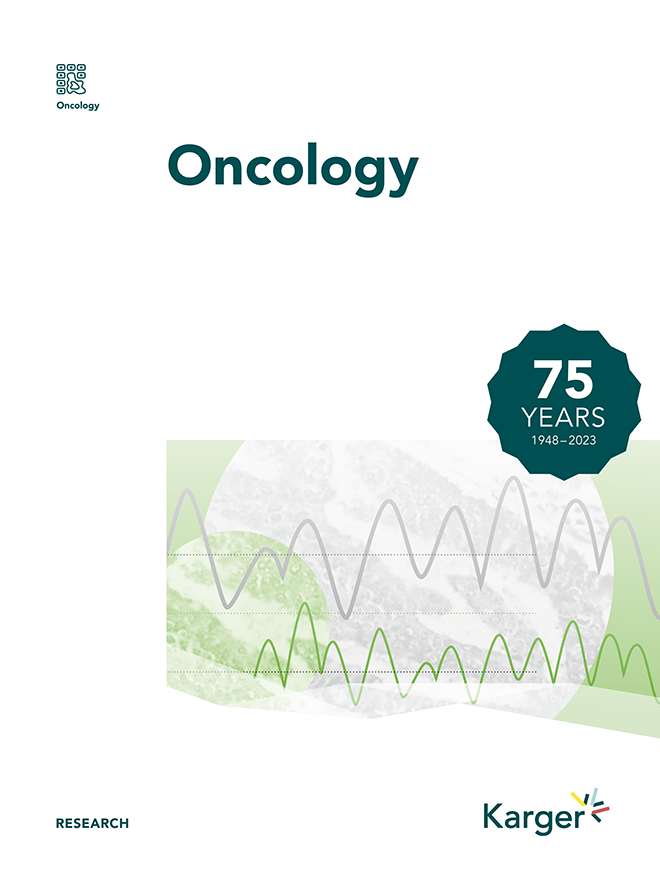
Artificial Intelligence and Decision-Making in Oncology
Artificial intelligence (AI) has made remarkable progress in recent years, transforming how we collect data, interact with machines, and work. These changes also affect how we make decisions in clinical practice, from assessing risks to recommending treatments. We welcome original and review papers on topics related to AI and decision-making in oncology. The manuscripts will be considered for the collection "AI and Decision-Making in Oncology".
Please select the option “Call for Papers: AI and Decision-Making in Oncology” when submitting your manuscript and mention this Call for Papers in your cover letter.
Oncology supports Open Access publications. Corresponding authors can publish Open Access articles at no or reduced cost if they are associated with or employed by one of these universities.
Submit Now Author GuidelinesMaurie Markman
Cancer Treatment Centers of America, Philadelphia, PA, USA
Guest Editor
Paul Martin Putora
Kantonsspital St. Gallen, St. Gallen, Switzerland
Email: Editorial Office
March 31, 2024
Impact Factor: 3.5
CiteScore: 6.0
Acceptance Rate: 17%
Time to first decision: 5 days
Psychiatry and Psychology
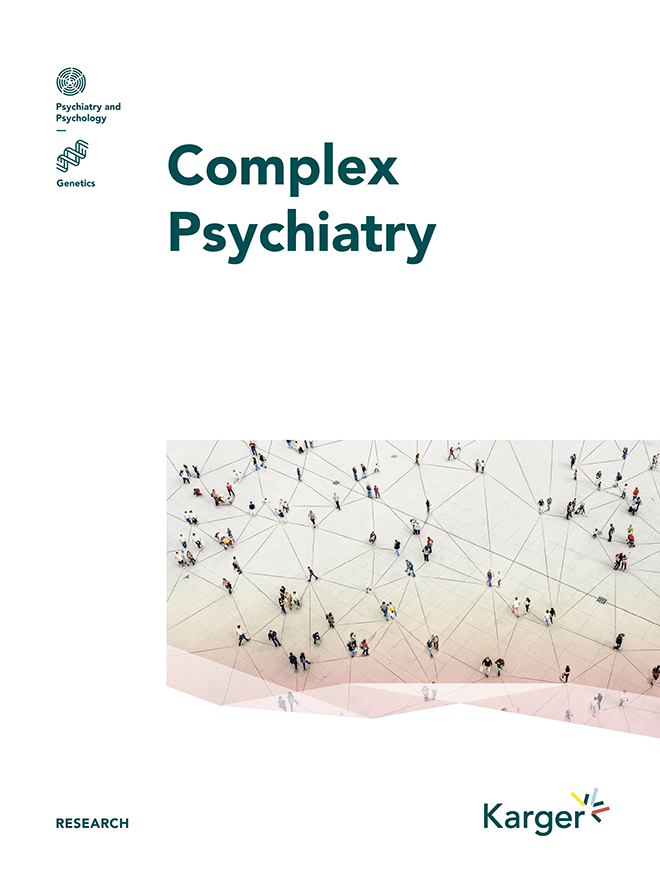
Biology, Genomics and Epidemiology of Mental Health Problems Related to COVID-19
The Complex Psychiatry journal aims to bring together in this article collection research articles, review articles, as well as brief reports that focus on furthering our understanding of the biology, genomics, and epidemiology of mental health problems related to COVID-19. Despite an increasing number of COVID-19 articles published since the beginning of the pandemic, we believe that there is still a gap in knowledge regarding the genetic epidemiology of mental health in this context, which this article collection aims to address.
Topics of particular interest are:
- Studies of the causal relationships of COVID-19 traits and psychiatric traits
- Epidemiology of COVID-19 with respect to psychiatric illness
- Genome-wide studies of comorbidities involving COVID-19 and mental health
- Pleiotropy analyses regarding COVID-19 and psychiatric traits
Please select the option “Call for Papers: Biology, Genomics and Epidemiology of Mental Health Problems Related to COVID-19” when submitting your manuscript and mention this Call for Papers in your cover letter.
Complex Psychiatry supports Open Access publications. Corresponding authors can publish Open Access articles at no or reduced cost if they are associated with or employed by one of these universities.
Submit Now Author GuidelinesJoel Gelernter
Yale University, New Haven, CT, USA
Renato Polimanti
Yale University, New Haven, CT, USA
Email: Editorial Office
December 20, 2023
Time to first decision: 24 days
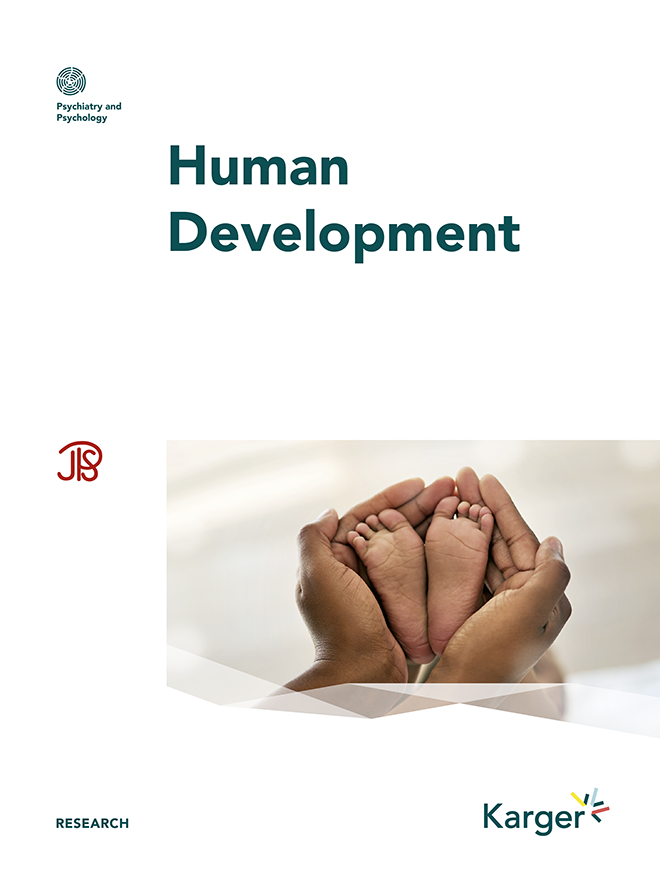
New Ideas in the Field of Human Development
Human Development welcomes all manner of conceptual articles - both theoretical and metatheoretical - related to the study of development. With each methodological and technological innovation in developmental science arrives both new conceptual confusions and opportunities for achieving new levels of conceptual clarity in the discipline. We enthusiastically call for manuscripts that identify and resolve such conceptual confusions, both in theory and method, as well as manuscripts that advance longstanding efforts to elucidate the metatheoretical assumptions underlying the study of development.
We would also like to especially encourage conceptual analysis and advancement related to the following topics:
- Current epistemologies in the study of development
- Developmental relations between so-called “higher” (e.g., executive function) and “lower” (e.g., sensorimotor sense-making) psychological processes
- Less well represented areas within developmental science such as the development of imagination and development in adulthood and older adults
Please select the option “Call for Papers: New Ideas in the Field of Human Development” when submitting your manuscript and mention this Call for Papers in your cover letter.
Human Development supports Open Access publications. Corresponding authors can publish Open Access articles at no or reduced cost if they are associated with or employed by one of these universities.
Submit Now Author GuidelinesDavid C. Witherington
University of New Mexico, Albuquerque, NM, USA
Editorial Office
March 29, 2024
Impact Factor: 3.7
CiteScore: 6.0
Public Health
Active Implementation in Translational Genomics
Genomics has progressed rapidly over the last 20 years since the first human genome was sequenced. Despite exciting genetic discoveries, implementation of genomic medicine into routine clinical practice remains challenging. This step is essential if genomics is to fulfil its promised potential and impact on patient experience and care.
To date there has been a wide range of interesting descriptive papers in the literature on the implementation of genomics into clinical practice. There is now an urgent need to examine investigations of implementation strategies that support adoption of clinical genomics. This special article collection calls for research articles, reviews and brief reports on implementation research across the translational spectrum, with an emphasis on active implementation, both in research and practice, across all areas of clinical genomics including rare disease, rare cancers, public health, precision medicine, cancer, mainstream such as cardiac care or diabetes. Appropriate submissions for this special edition include but are not limited to the following areas:
- Studies investigating and enhancing a reduction in inequity in implementation of genomics
- The use of innovative implementation science methodological approaches including novel study designs
- Cross disciplinary studies where implementation science is combined and complemented by other research disciplines
- Investigations testing implementation strategies to enhance implementation outcomes e.g., acceptability, feasibility and adoption
- Collaborative implementation science studies including strong consumer involvement
- Studies that adopt transferable learning from one clinical area or geographical area into clinical genomics or another setting
- The use of technology including AI to enhance implementation
- Approaches trialed to accelerate implementation science endeavors while retaining a robust and rigorous methodology
- Reports on studies centered on scaling up or sustainability of clinical genomics
Please select the option “Call for Papers: Active Implementation in Translational Genomics” when submitting your manuscript and mention this Call for Papers in your cover letter.
Karger has established agreements with consortia and institutions that include full or partial coverage of Article Processing Charges (APC). Corresponding authors can publish Open Access articles at no or reduced cost if they are associated with or employed by one of these universities.
Submit Now Author GuidelinesColleen Marie McBride
Emory University, Atlanta, USA
Guest Editors
Stephanie Best
University of Melbourne, Melbourne, Australia
Megan C. Roberts
University of North Carolina at Chapel Hill, Chapel Hill, USA
Natalie Taylor
University of New South Wales, Sydney, Australia
Editorial Office
March 31, 2024
Impact Factor: 1.7
CiteScore: 3.5
Future Forecasting for Research and Practice in the Public Health Translation of Genomic Discovery
Public Health Genomics publishes rigorous research and evidence-based practice at the intersection of genomic discovery and public health. Under the leadership of the new Editor-in-Chief, Colleen M. McBride, the journal is calling for perspective pieces with the theme “Future forecasting for research and practice in the public health translation of genomic discovery” to be featured in a special collection highlighting the current breadth of research and practice opportunities for genomics to have a positive public health benefit. Submissions include but are not limited to the following questions:
- What innovations — in communications, community engagement, implementation, health care delivery, and public policy — are needed to expand the reach of genomic discovery to populations?
- How can we develop a sustainable workforce to ensure just access to evidence-based genomic applications?
- How can we foster the transdisciplinary collaborations needed for translational research aiming to integrate genomics into existing public health programs (e.g., expertise in social determinants of health, basic science, health promotion, population screening, big data collection)?
- What work is being done that exemplifies where the field needs to go to ensure health benefits population-wide and globally (e.g., testing of genomics-informed health interventions that are sustainable and scaleable)?
- What ongoing policies and legal reforms will be needed to ensure equitable access to evidence-based genomic applications?
- How might barriers to population-wide genetic risk assessment (e.g., newborn screening, family history, genetic counseling, and testing) be addressed to ensure equitable access to genomic advances?
- What study designs and methods will be needed to develop an evidence base to guide the translation and implementation of genomics to public health
Please select the option “Call for Papers: Future forecasting for research and practice in the public health translation of genomic discovery” when submitting your manuscript and mention this Call for Papers in your cover letter.
Karger has established agreements with consortia and institutions that include full or partial coverage of Article Processing Charges (APC). Corresponding authors can publish Open Access articles at no or reduced cost if they are associated with or employed by one of these universities.
Journal Home Author GuidelinesColleen M. McBride
Rollins School of Public Health, Emory University, Atlanta, US
Editorial Office
The submission deadline has passed. To submit your manuscript to this collection, please contact the Editorial Office.
Impact Factor: 1.7
CiteScore: 3.5

